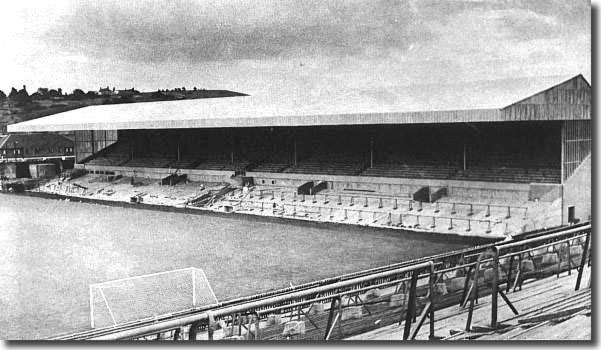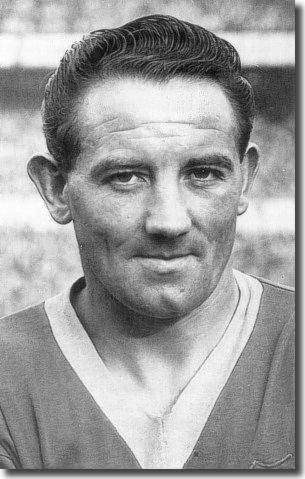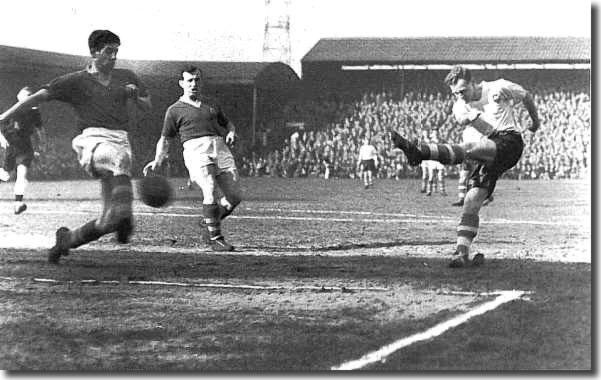 For
almost a decade Leeds United had to all intents and purposes BEEN one
man. The legendary John Charles
had towered over Elland Road like a huge Colossus, first as an awesome
defensive lynchpin, then effortlessly transferring his talents to a forward
role and becoming one of the most sought after talents in world football.
As the curtain fell on the 1956/57 season after
a promising return for Leeds to First Division football, however, the
club were coming to terms with the realisation that they now faced an
uncertain future without the Welsh maestro.
For
almost a decade Leeds United had to all intents and purposes BEEN one
man. The legendary John Charles
had towered over Elland Road like a huge Colossus, first as an awesome
defensive lynchpin, then effortlessly transferring his talents to a forward
role and becoming one of the most sought after talents in world football.
As the curtain fell on the 1956/57 season after
a promising return for Leeds to First Division football, however, the
club were coming to terms with the realisation that they now faced an
uncertain future without the Welsh maestro.
A long-unning battle to hang onto Charles had finally been lost when
the directors accepted a world record transfer fee from Italian giants
Juventus. The decision was taken partly because of the need to bolster
the club's financial standing after the damage to the Elland Road stadium
caused by fire the previous autumn. A public appeal had raised £60,000
towards a replacement stand and at the start of the season the new £180,000
West Stand was unveiled. Tickets for the 4,000 seats cost 7s 6d each per
game in those days and in front of the seated arena was a large paddock
capable of holding 6,000 standing spectators.
Charles' departure left a massive gap, and manager Raich
Carter had hoped that much of the £65,000 fee would be made available
to him to improve his squad. He had already started planning for the future
when he brought in Scottish inside-forward George O'Brien from Dunfermline
Athletic in March, although he didn't find the net in any of his eight
games in 1956/57. Carter splashed out £12,000 on another Scot, Airdrie's
Hugh Baird, during the summer and then also secured the services of black
South African right winger Gerry Francis.
Baird had already won a Scottish cap while he was with Airdrie and had
scored 165 goals for them in six seasons. He looked like a promising replacement
for Charles, but the weight of expectation hung heavy upon him.
Francis had come to England from City & Suburban in Johannesburg and
had signed initially as an amateur. He was the first black player to play
for Leeds, although it was to be a couple of years before he made his
debut.
Raich Carter was disappointed and disillusioned that he was given little
cash to work with and feared the worst as he prepared for the new season.
He did have the reassurance, however, of a settled and experienced defence
- goalkeeper Roy Wood, full-backs Jimmy Dunn and Grenville Hair, and the
half-back line of Archie Gibson, Jack
Charlton and Eric Kerfoot had played virtually unchanged for what
seemed like years and remained first choices as the new season dawned.
The concern, however, was for the team's firepower, and things looked
bleak when Leeds lost their first two games, at Blackpool and Aston Villa,
without even looking like they were going to score. Baird got off the
mark with a penalty and winger Jack Overfield netted the other goal in
a 2-1 win against Leicester City as the club christened their new look
stadium at Elland Road. The Scot added another couple, while O'Brien and
veteran Harold Brook completed the 4-0, win in the return with Villa,
but it was a false dawn. Leeds visited champions Manchester United and
crashed 5-0 and then managed just  one
goal during the two home defeats which followed. The team had managed
just four points from their opening seven matches and they were struggling
to find the net.
one
goal during the two home defeats which followed. The team had managed
just four points from their opening seven matches and they were struggling
to find the net.
They still had a wonderful new stand, most of the same players that had
taken them up and their First Division status, but they had lost John
Charles and much of their spirit had gone with him - all they had to look
forward to was a long hard winter struggling against the spectre of relegation.
While Charles was inspiring his new team to the Italian championship,
Leeds United were aimlessly drifting.
A 2-0 defeat at Tottenham in October was pretty representative of the
dismal period. The Times: 'This was one match which will fail to
stir the memory. With little at stake Saturday afternoon at White Hart
Lane wore an air of untidiness which was a particular disappointment after
Spurs' general improvement of late. Leeds United played as a team of individuals
without any coherent plan. That their defeat was confined to a pair of
goals was due more to the Spurs' inept finishing than to any stubbornness
on their part in defence.
'In fact Leeds should have sprung a surprise from the kick off for after
a sharp thrust down the left between Overfield and Baird, Brook was left
with a clear sight of goal only to hesitate and lose his opportunity.
'At first Spurs seemed still charged with invigorating Swiss air, but
then the mistakes began to creep in. There were muddles in defence, passes
began to go astray; Baird completely beat Norman and Baker only to shoot
straight at Ditchburn. Then, as suddenly, Leeds were under severe pressure.
Four corners were given away in succession until in the thirty first minute
Robb was awarded a free kick out on the left. He pitched to the far post
for Medwin to head down and past the helpless Wood.
'Baird nearly brought Leeds back into the game with another individual
effort which flashed the wrong side of the post, but in the seventy fifth
minute Smith made the game safe for Spurs by beating Wood at close range
following a move between Blanchflower, Robb and Dunmore.'
Baird was regularly on the score sheet throughout the season, but was
not in the same league as Charles and there was no one else around who
could take on the mantle of leader. Raich Carter brought in Irish midfielder
Wilbur Cush in November for £7,000 and appointed him captain, but he made
his debut in the middle of a five-game losing run and when Leeds were
on the wrong end of a 3-1 scoreline on November 23 they lay three from
bottom of the table, just a point clear of the relegation places.
29-year-old Cush was an Irish international and Ulster's Footballer of
the Year winning a host of Irish trophies with Glenavon, his first club.
His arrival helped somewhat to stem the tide in United's fortunes and
his first goal for the club earned a 1-1 draw at home to Birmingham on
30 November. Even though their trip to Chelsea ended in another defeat,
Leeds then unexpectedly won two home games against Newcastle and Blackpool.
The 3-0 win against the Geordies was particularly valuable as they were
also embroiled in the battle against the drop, while the victory over
the Seasiders saw Leeds rise to sixteenth spot and a five point cushion
over the teams in the relegation zone.
From then on the team's form settled down somewhat in the league with
a number of important wins and even a home draw against reigning champions
Manchester United, about to have the heart ripped out of their fine young
side by the Munich Airport tragedy.
back to top
Away from league action, the FA Cup may have seen Leeds take their customary
exit at the first time of asking, but did generate a little piece of footballing
history. In both 1956 and 1957, the third round draw pitted United at
home to Cardiff City at Elland Road and on both occasions the score was
2-1 to the Welsh team. 1958 incredibly saw the tie repeated and even more
astonishingly Leeds again lost 2-1. It was a disappointing way to mark
their season, but better that than relegation and the club's results during
March and April were surprisingly good. In fact, the team lost just one
of the final nine matches.
It was just as well, however, because the game that preceded that run
ended in a 3-0 defeat at Preston North End, leaving Leeds level on points
with Sheffield Wednesday  and
Sunderland at the foot of the table. Tom Finney who was on his way to
the World Cup finals with England hit two of the Preston goals that day.
More than a decade earlier, the same Finney had scored his first League
goal against Leeds. Despite the Preston defeat, the improvement in form
which followed was so marked that a 1-1 draw away to Birmingham on April
12 left Leeds safe from the drop with two games still to play.
and
Sunderland at the foot of the table. Tom Finney who was on his way to
the World Cup finals with England hit two of the Preston goals that day.
More than a decade earlier, the same Finney had scored his first League
goal against Leeds. Despite the Preston defeat, the improvement in form
which followed was so marked that a 1-1 draw away to Birmingham on April
12 left Leeds safe from the drop with two games still to play.
They finished 17th and breathed a sigh of relief having hung on to their
hard won top flight status, but manager Raich Carter had little time for
celebration. Carter's five-year contract came up for renewal at the end
of the season and the directors decided on the strength of just one poor
campaign that they would not give him an extension on his contract. Carter
was mortified by the decision and complained that he had been given insufficient
money from the John Charles transfer deal to replace the Welshman and
that the team would always struggle without their star. The board was
adamant, however, and showed Carter the door, inviting his inexperienced
assistant, trainer Bill Lambton, to take temporary control as acting manager.
A couple of years previously things had looked particularly rosy for
Leeds United Football Club, but while the country was looking forward
with excitement to the World Cup in Sweden in the Summer of 1958, clouds
of dismal indecision and uncertainty descended upon Elland Road.
Other Football Highlights from 1957/58
- The plane carrying the Manchester United party back from a European
Cup tie in Belgrade crashed in the snow at Munich airport on February
6. 23 passengers, including eight of the legendary Busby Babes and former
Manchester City goalkeeper Frank Swift, all died
- United recovered sufficiently to battle their way to the Cup final
but they lost 2-0 to Bolton, for whom Nat Lofthouse scored both goals.
The second goal came when Lofthouse shoulder charged goalkeeper Harry
Gregg over the line with the ball in his hands
- Wolves won the League title, finishing five points clear of Preston
- Hearts' first Scottish championship this century was one of the most
convincing ever seen in Britain as they lost just one game and scored
132 goals, conceding just 29
- There was an amazing Second Division match at The Valley on December
21. Huddersfield were playing at Charlton and went in 2-0 up at half
time, but by the 52nd minute had moved into a seemingly unassailable
5-1 lead. Then Charlton's veteran journeyman forward Johnny Summers
hit a six-minute hat trick and then a further two goals, all with his
weaker right foot, to give Charlton a 6-5 lead. Huddersfield equalised
with two minutes to go, before Summers set up Ryan for Charlton's winner
in the last move of the match
- The Football League decided to scrap the Northern and Southern sections
of Division Three for next season and replace them with Third and Fourth
Divisions
- Sunderland were relegated to the Second Division for the first time
in their history and their Clown Prince inside-forward Len Shackleton
was forced to retire after 320 league appearances for the club
- All four British teams qualified for the 1958 World Cup finals held
in Sweden in the summer of 1958. England drew all three group games
and finished level with the Soviet Union, but went out on a play off.
Scotland finished bottom of their group, below France, Yugoslavia and
Paraguay. Northern Ireland battled through to the quarter finals before
losing 4-0 to France. Wales also reached the quarter-finals and were
unlucky to lose 1-0 to eventual winners Brazil
- The Brazilians were inspired by 17-year-old Pele and beat host nations
Sweden 5-2 in a memorable final with the youngster hitting two of the
five goals. It was the first time that any side had won the trophy when
playing outside their own continent












 For
almost a decade Leeds United had to all intents and purposes BEEN one
man. The legendary John Charles
had towered over Elland Road like a huge Colossus, first as an awesome
defensive lynchpin, then effortlessly transferring his talents to a forward
role and becoming one of the most sought after talents in world football.
As the curtain fell on the 1956/57 season after
a promising return for Leeds to First Division football, however, the
club were coming to terms with the realisation that they now faced an
uncertain future without the Welsh maestro.
For
almost a decade Leeds United had to all intents and purposes BEEN one
man. The legendary John Charles
had towered over Elland Road like a huge Colossus, first as an awesome
defensive lynchpin, then effortlessly transferring his talents to a forward
role and becoming one of the most sought after talents in world football.
As the curtain fell on the 1956/57 season after
a promising return for Leeds to First Division football, however, the
club were coming to terms with the realisation that they now faced an
uncertain future without the Welsh maestro. one
goal during the two home defeats which followed. The team had managed
just four points from their opening seven matches and they were struggling
to find the net.
one
goal during the two home defeats which followed. The team had managed
just four points from their opening seven matches and they were struggling
to find the net. and
Sunderland at the foot of the table. Tom Finney who was on his way to
the World Cup finals with England hit two of the Preston goals that day.
More than a decade earlier, the same Finney had scored his first League
goal against Leeds. Despite the Preston defeat, the improvement in form
which followed was so marked that a 1-1 draw away to Birmingham on April
12 left Leeds safe from the drop with two games still to play.
and
Sunderland at the foot of the table. Tom Finney who was on his way to
the World Cup finals with England hit two of the Preston goals that day.
More than a decade earlier, the same Finney had scored his first League
goal against Leeds. Despite the Preston defeat, the improvement in form
which followed was so marked that a 1-1 draw away to Birmingham on April
12 left Leeds safe from the drop with two games still to play.